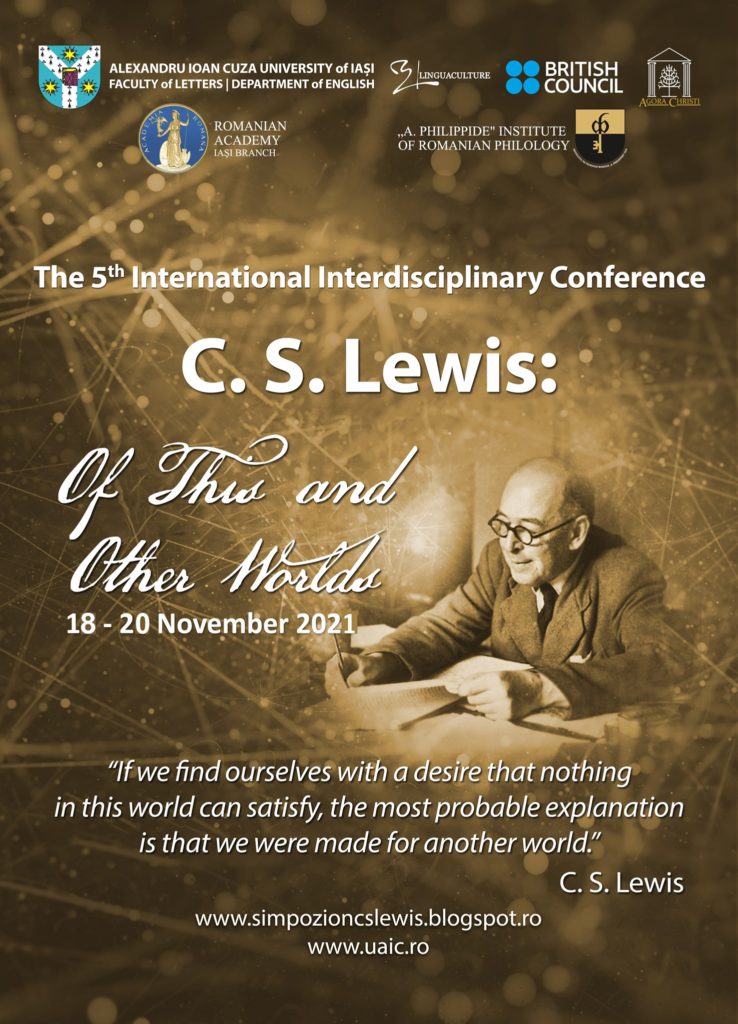Three years ago, at a C. S. Lewis conference at Wheaton College’s Marion E. Wade Center, I met a Romanian professor, Dr. Denise Vasiliu, who talked with me about the Lewis society she had helped inaugurate at a Romanian university. She had the distinction of being the first Romanian student whose doctoral dissertation was on Lewis, and she hoped that I would be able to speak at one of their conferences. I was immediately caught up in her vision for spreading knowledge of Lewis in a former communist country. After two false starts, I was finally able to participate in a conference, albeit remotely, just last week.
Due to the ongoing COVID situation, especially in Europe right now, most of the main presenters were on Zoom, a technology we have all become accustomed to in the past year and a half. And while nothing can completely compete with on-site, face-to-face encounters, I am grateful that we all, from a number of nations, were able to link up together in this fashion.
Keynote speakers included James Como, a prolific author on Lewis and one of the original members of the New York C. S. Lewis Society, the oldest such society in America, founded in 1969, just six years after Lewis’s death. Wheaton College professor Jerry Root, another Lewis scholar as well as an engaging speaker, offered his usual wit and wisdom. Then there was Malcolm Guite, poet-priest and Chaplain of Girton College in Cambridge University. His sparkling elucidatIon of The Voyage of the Dawn Treader was a highlight of the conference, in my opinion. In addition, many other Lewis scholars offered papers on a variety of subjects related to the theme of the conference.
I made two contributions: one as a paper on a panel; the other as one of the keynote speakers. For the panel, I focused on Lewis’s concern for the tendency toward what he termed the “omnicompetent state.”
Drawing from concepts in The Abolition of Man and from some of Lewis’s essays and letters, I explained how the third novel in his Ransom Trilogy can help readers understand those concepts in story form. The key points in Abolition that found a home in That Hideous Strength can be summarized thusly:
My keynote address was more personal, as it was the “story,” if you will, of why and how I decided to write my Lewis book, the goal of which was to shine light on Lewis’s contacts with Americans and the degree to which he remains a strong influence on American Christians of all stripes: those who understand the essence of “mere Christianity.”
The final Roundtable was also a wonderful experience, as I was able to join some of the Lewis scholars in a discussion covering not only the insights from the conference but the goals each of us have in our ongoing scholarship.
My friend, Brenton Dickieson (bottom left), did a great job moderating the Roundtable, leading each of us into one topic after the next. In the smaller box on the top left is Jerry Root. Beneath him is Malcolm Guite, and to his right is the grandson of Owen Barfield, Lewis’s good friend (the grandson shares his grandfather’s name). George MacDonald scholar Kirstin Jeffrey Johnson is at bottom right.
Although the experience was remote/virtual, it was gratifying and satisfying. The goal, though, is an in-person visit next time.
Those of us who attend these conferences naturally love reading Lewis and kindred spirits, but the reason we love reading them is because they aid in guiding us into a fuller, more enriching comprehension of the Christian life, both intellectually and experientially. Christ is always the cornerstone of our faith, but we appreciate those who help us build on that cornerstone.






